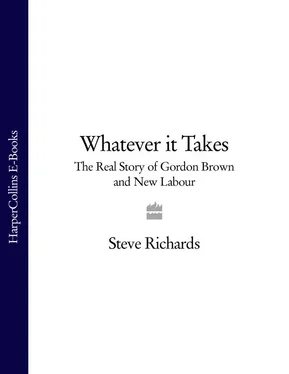One exchange with Brown in particular had remained in Clegg’s mind. The two of them had been discussing a book and getting on reasonably well. Clegg then merged the friendly discussion into one about party politics. Brown changed within a nanosecond from the engaged, enthusiastic bibliophile to the rigidly controlled tribalist. Clegg felt it was like talking to a different person, and in some ways it was. Brown could become unnecessarily defensive when engaging with political opponents and switch personality accordingly. Clegg was so shocked that he was convinced, wrongly, that Brown would be incapable of making the leap to multi-party politics.
Shortly after making his statement Cameron spoke to Clegg on the phone and reiterated the degree to which the offer was sincerely made. They agreed that negotiations between the two sides should begin.
Clegg’s negotiating team signalled clearly which way he was heading. David Laws had been wooed several times by the Conservatives in the hope he would defect. Danny Alexander was in effect Clegg’s representative. Chris Huhne was part of the generation of Liberal Democrats that yearned for power, and had told friends before the campaign that it would be impossible for the Liberal Democrats to make a deal with Labour if the government had lost its overall majority. Although instinctively more of a social democrat than Laws and Clegg, he had made the leap towards working with the Conservatives before a single vote had been cast. He wanted power.
In Number Ten power was an issue too. Two forces came together on the Friday afternoon, a Blairite-Brownite assumption that Labour should do whatever it took to retain power and the ultra-Blairite hunger for realignment on the centre left. Brown, Balls, Ed Miliband, Alastair Campbell and Peter Mandelson had been conditioned to fight for power, having been removed from it for so long in the 1980s and 1990s. At the same time Adonis in particular had yearned for realignment on the centre left. All of them were dreaming with different reasons and varying degrees of enthusiasm of a Lib/Lab coalition. At one point over the weekend Mandelson joked that ‘Andrew has been waiting since 1906 for this moment to arrive.’ They were not giving up now. In spite of Brown’s public words earlier that he understood the right of Cameron and Clegg to seek agreement, Mandelson and Campbell urged Brown to speak to Clegg that evening in order to make clear that he was deadly serious about a Lib/Lab coalition.
Late on Friday afternoon Brown and Clegg spoke, each of them exhausted and instinctively wary of the other. Clegg did not welcome the call, regarding it as a diversion when the talks with the Conservatives had not properly begun. Brown’s people-management skills were dreadful even when he had enjoyed a good night’s sleep. Rarely in his career had he prevailed by intoxicating charm. His preferred approach was to put a relentless, unswerving case complete with warnings about the consequences of moving in a different direction to the one he had espoused. With Clegg, he tried his best in his formulaic opening: ‘Nick, how’s it going … have you had much sleep?’ But the polite formalities were brief.
Quickly Brown made clear that Labour would offer a referendum on electoral reform as its top priority. A Lib/Lab coalition would be united in its support. To Brown’s annoyed dismay, Clegg showed limited enthusiasm. He told Brown that he thought there were insuperable obstacles in terms of the parliamentary arithmetic and political legitimacy if the parties that came second and third formed a government, but he acknowledged the Lib Dems had more in common with Labour than the Conservatives. The two were speaking blindly, having spent the preceding hours acquiring wholly different mindsets. Clegg had been enthused by Cameron. Brown had become increasingly excited by his conversations with Adonis in particular about a Lib/Lab coalition. Characteristically, Brown did not give up, pointing out to Clegg that his party would find it far easier working with Labour. To Clegg’s sleepless fury Brown suggested that the Lib Dems would not tolerate an arrangement with the Conservatives, especially when Labour was holding out the historic chance to change the voting system. Brown could not hide his frustration. He never could, whether in cabinet meetings, in one-to-one sessions with Blair, or during long-winded international gatherings. For a calculating politician, Brown was also surprisingly transparent.
As far as Clegg was concerned Brown had been too transparent. One of Clegg’s team briefed the BBC that the call had been bad-tempered. Evidently they wanted to signal to their party that a route towards Labour was fraught with difficulties. If Clegg had felt instinctively more solicitous towards Brown he would have controlled his annoyance. He did not bother to do so.
At which point the media, a pivotal element in the entire New Labour saga, played its part in one final decision. Since the early hours of Friday morning some newspapers had screamed that Brown appeared determined to ‘squat’ in Number Ten. In fact until a new government could be formed he had a constitutional duty to remain in place. But in order not to look like a trespassing obsessive, Brown left Number Ten on the Saturday morning to spend the weekend in his constituency. Briefly he left the heart of the government’s operation when there was still much to do, not least in speaking to Labour MPs about the plans for a coalition. He did spend much of his time on the Saturday when he was in Scotland speaking to union leaders in order to get their support for what he was doing. He still had a hold of a sort over them. No union leader spoke out against a Lib/Lab coalition in the days that followed.
While Brown spoke to union leaders, Adonis contacted his friends in the Liberal Democrats, those with whom they had discussed for years the possibility of realignment. His conversations with Ashdown were especially fruitful. Adonis argued with his engaging modest conviction – an approach to politics and journalism that had captivated Roy Jenkins more than a decade earlier – that the parliamentary arithmetic did not rule out a Lib/Lab coalition. With patient persistence he pointed out that a Lib/Lab government would have 315 seats compared with 306 for the Conservatives. Although this was not an overall majority it was safe to assume that the assorted nationalists would not bring down the coalition in alliance with the Tories. Adonis made it clear that Brown was not necessarily proposing a ‘rainbow coalition’ with several other minority parties, as the media continued to report, but a Lib/Lab government that would rule at least long enough to introduce electoral reform.
Ashdown started to sway towards such an arrangement. Three other former leaders, Ming Campbell, Charles Kennedy and David Steel, also indicated privately or in Steel’s case publicly that they would prefer an arrangement with Labour. Adonis also had considerable influence on Tony Blair. Brown had spoken to Blair on the Friday and noted his scepticism about the feasibility of a Lib/Lab coalition because of the parliamentary arithmetic. Over the weekend Blair became more supportive of the idea.
In every frenzied conversation involving Adonis, Mandelson and senior Liberal Democrats, the position of Brown was raised as an overwhelming obstacle. Clegg had stated during the campaign that he could not do a deal with a defeated Brown. Over the weekend Ashdown told Adonis the same. A close ally of Clegg’s, Neil Sherlock, who had spent as many hours as Adonis contemplating a realignment on the centre left, also made it clear that no deal could be done with Brown continuing for any length of time as Labour’s leader. Vince Cable spoke directly to Brown several times over the weekend. The two were old friends. Cable retained a certain limited respect for Brown and the two of them shared a fair amount of common political ground, at least in relation to economic policy. He gave a much stronger indication than Clegg that he would prefer to work with Labour, an appetite heightened perhaps by the fact that he was not part of the Liberal Democrats’ negotiating team and had in Brown’s view been deliberately marginalized by Clegg. At one point Cable told Brown: ‘Emotionally I’m closer to Labour.’
Читать дальше












